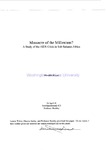| dc.rights.license | In Copyright | en_US |
| dc.creator | Mlynar, Meredith | |
| dc.date.accessioned | 2014-01-02T16:38:05Z | |
| dc.date.available | 2014-01-02T16:38:05Z | |
| dc.date.created | 2000 | |
| dc.identifier | WLURG38_Mylnar_POV_2000_wm | |
| dc.identifier.uri | http://hdl.handle.net/11021/26074 | |
| dc.description | Meredith Mlynar is a member of the Class of 2000 of Washington and Lee University. | en_US |
| dc.description | Capstone; [FULL-TEXT FREELY AVAILABLE ONLINE] | en_US |
| dc.description.abstract | . . . With 95% of HIV-infected people living in developing countries, AIDS has become a "disease of Third World poverty rather than First World affluence."
No one knows what AIDS will do to the economy and people's quality of life in poor countries, for nowhere has the epidemic run its course. We do know, however, the causes behind AIDS' prevalence in Sub-Saharan Africa; the devastating effects it has on families, communities, and governments; the response these entities have had to it; and what further steps should be taken to counteract its spread and destruction. Some countries, such as South Africa, have taken very few steps and rates of infection are steadily increasing. Uganda, however, serves as an elucidative model for what can occur when families, community organizations, non-governmental organizations (NGOs), and the government make an effort to decrease the prevalence of this disease. Uganda testifies to the fact that although it is more difficult for developing countries to combat such a formidable foe with fewer resources than developed countries, it is possible, and it is definitely imperative. [From Why Should We Care About AIDS in Africa?] | en_US |
| dc.description.statementofresponsibility | Meredith Mlynar | |
| dc.format.extent | 29 pages | en_US |
| dc.language.iso | en_US | en_US |
| dc.rights | This material is made available for use in research, teaching, and private study, pursuant to U.S. Copyright law. The user assumes full responsibility for any use of the materials, including but not limited to, infringement of copyright and publication rights of reproduced materials. Any materials used should be fully credited with the source. | en_US |
| dc.rights.uri | http://rightsstatements.org/vocab/InC/1.0/ | en_US |
| dc.subject.other | Washington and Lee University, Shepherd Poverty Program | en_US |
| dc.title | Massacre of the Millenium? A Study of the AIDS Crisis in Sub-Saharan Africa | en_US |
| dc.type | Text | en_US |
| dcterms.isPartOf | RG38 - Student Papers | |
| dc.rights.holder | Mlynar, Meredith | |
| dc.subject.fast | Capabilities approach (Social sciences) | en_US |
| dc.subject.fast | HIV infections -- Social aspects | en_US |
| dc.subject.fast | HIV infections -- Prevention | en_US |
| dc.subject.fast | Human capital | en_US |
| dc.subject.fast | Public health | en_US |
| dc.subject.fast | Health education | en_US |
| dc.subject.fast | Sub-Saharan Africa | en_US |
| local.department | Shepherd Poverty Program | en_US |
| local.scholarshiptype | Capstone | en_US |
